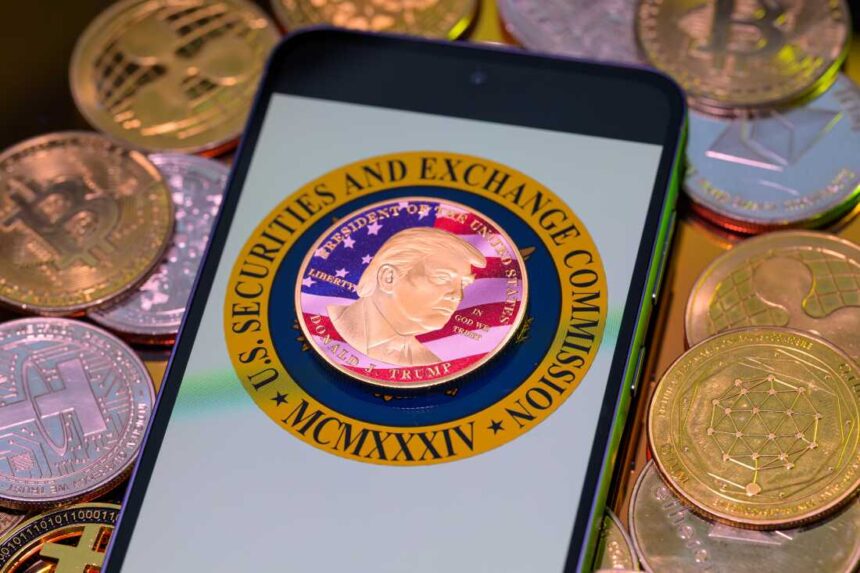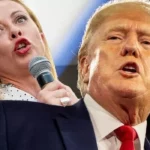The global financial system is undergoing a transformation, and at the heart of this shift is the United States’ new approach to cryptocurrency and trade. In March 2025, President Donald Trump issued an executive order to establish a U.S. Bitcoin reserve, signaling a dramatic shift in how the government views digital assets. Simultaneously, his administration has launched aggressive trade policies, imposing high tariffs on key trading partners, leading to market volatility and potential global economic realignments. While these strategies are intended to strengthen the U.S. economy, they also pose significant risks—particularly to the long-standing dominance of the U.S. dollar in global markets.
Trump’s Bitcoin Reserve: A Bold but Risky Move
On March 6, 2025, Trump announced the creation of a federal Bitcoin reserve, branding it as “digital gold.” The reserve will be funded through Bitcoin (BTC) seized by federal law enforcement agencies and, if necessary, supplemented by purchases from the open market. The administration’s goal is to gain a first-mover advantage as BTC continues to be recognized as a store of value worldwide. With Bitcoin’s total supply capped at 21 million coins, Trump’s administration sees this as an opportunity to secure a valuable financial asset before its scarcity drives prices even higher.
However, this move comes with significant risks. The U.S. dollar has long been the world’s primary reserve currency, providing the country with unparalleled economic leverage, including the ability to borrow at low interest rates. By endorsing Bitcoin as a strategic reserve asset, the U.S. could unintentionally encourage a shift away from the dollar. Countries already exploring alternative reserves—such as Brazil, El Salvador, Bhutan, and even China—may accelerate their diversification efforts, reducing demand for U.S. dollars and challenging its global supremacy.
The introduction of a Bitcoin reserve also raises questions about financial stability. Unlike traditional reserve assets such as gold, the euro, or the yen, Bitcoin is highly volatile. If its value swings dramatically, the U.S. reserve could face significant valuation risks. Additionally, by embracing a decentralized asset, the U.S. government may struggle to maintain control over monetary policy, further complicating its economic strategy.
The Impact of Trump’s Trade Wars
Alongside his cryptocurrency strategy, Trump has intensified trade wars with key U.S. partners, imposing:
- 25% tariffs on Canadian and Mexican imports
- Increased tariffs on Chinese goods, raising the average tariff to 39%
- Potential new tariffs on European agricultural products
These protectionist policies are designed to reduce U.S. trade deficits, incentivize domestic manufacturing, and strengthen American industries. However, they have also triggered economic instability and retaliatory measures from affected countries.
Effects on the Global Economy
- Canada and Mexico: As the U.S.’s largest trading partners, both countries rely heavily on exports to the American market. These tariffs weaken their currencies, making imports more expensive and reducing their purchasing power.
- China: China has a more diversified export base and a controlled currency regime, which allows it to absorb trade shocks more effectively than Canada and Mexico. However, sustained tariffs could push China toward greater financial independence, reducing reliance on the U.S. dollar.
- European Union: With tariffs looming over its agricultural sector, the EU is already exploring currency diversification, potentially moving away from dollar reserves and shifting trade relationships to alternative markets.
- United States: Tariffs on Chinese imports could lead to higher U.S. production costs, increasing consumer prices and inflation. This could further erode confidence in the U.S. dollar, particularly if trade partners begin conducting transactions in alternative currencies or digital assets.
The Risk to the U.S. Dollar’s Dominance
The Trump administration’s economic strategy rests on the assumption that other countries will continue to depend on the U.S. market, even at the cost of absorbing higher tariffs. This assumption is embedded in what some analysts call the “Mar-a-Lago Accord,” a strategy where the U.S. pressures foreign governments to weaken their currencies relative to the dollar. This, in theory, would make U.S. exports more competitive and lower borrowing costs domestically. However, if key trading partners resist these tactics, the plan could backfire, undermining the very economic strength it aims to protect.
If major economies move away from the dollar in response to these policies, the long-standing benefits of dollar hegemony—such as the ability to print money without inflationary consequences and borrow at low rates—could diminish. Already, China, the European Union, and even Switzerland are considering alternative reserve strategies that could challenge U.S. financial dominance. Bitcoin, paradoxically endorsed by Trump, could become a major beneficiary of this shift if it is perceived as a stable store of value independent of U.S. monetary policy.
Trump’s Alleged Binance Deal: Conflict of Interest?
Adding to the controversy, recent reports suggest that Trump’s family is negotiating to acquire a stake in Binance’s U.S. operations. This raises concerns about potential conflicts of interest, particularly in light of Binance’s legal troubles. In November 2024, the company was fined $4.3 billion for violating anti-money laundering laws, and its founder, Changpeng Zhao (CZ), served a four-month prison sentence.
According to The Wall Street Journal, Binance has offered Trump’s allies a business deal as part of its strategy to re-establish itself in the U.S. This raises ethical questions about whether regulatory leniency or even a pardon for CZ could be part of the arrangement. If the Trump administration’s economic policies are influenced by personal financial interests, it could undermine confidence in U.S. financial regulations and institutions.
Final Assesment
Trump’s economic strategy—embracing Bitcoin while waging trade wars—represents a bold but potentially destabilizing shift in global finance. Establishing a Bitcoin reserve could weaken the U.S. dollar’s dominance, while aggressive tariff policies risk alienating key trade partners and accelerating global financial diversification. The reported negotiations between Trump’s family and Binance further complicate the situation, raising ethical concerns about conflicts of interest in policymaking.
The long-term consequences of these policies remain uncertain. If successful, they could establish the U.S. as a leader in digital finance while reshaping global trade dynamics in favor of American industries. However, if they backfire, they could erode confidence in the U.S. dollar, weaken economic stability, and pave the way for new financial centers outside of American influence. As Trump forges ahead with his ambitious economic experiments, the world watches closely to see whether this strategy will secure America’s financial future or accelerate its decline.







